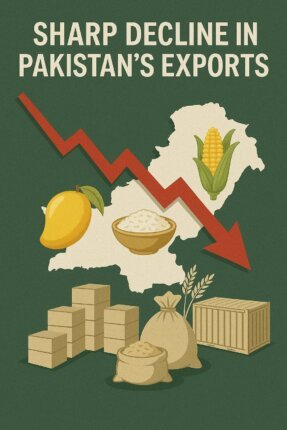Rice, corn, and mango exports suffer drastic decline in first half of the year
ISLAMABAD: Pakistan’s agricultural export figures have taken a significant hit in the first half of 2025, with rice exports dropping to 803,667.208 metric tons, a stark decline of 79.90% compared to 3,999,679 metric tons during the same period in 2024, available data revealed.
The export of Pakistani rice to the European Union (EU) has been particularly affected, plummeting to 50,783.203 metric tons, an 83.60% decline in the first six months of 2025 compared to 309,689 metric tons in 2024.
In addition, the Rapid Alert System for Food and Feed (RASFF) of the EU notified 31 interceptions of Pakistani rice shipments due to aflatoxin contamination and pesticide residues in the first half of 2025.
Following a similar trend, exports of Pakistani corn to Vietnam have dropped dramatically to zero in the first half of 2025, marking a 100% decline from 180,452.52 metric tons in 2024. The Ministry of Food saved itself from the Prime Minister’s wrath by offering misleading justifications, claiming that corn could not be exported to Vietnam due to low international prices, higher domestic consumption, and reduced production in Pakistan. However, the actual reason was the failure of the National Agri Trade & Food Safety Authority (NA&FSA), (former Department of Plant Protection) to implement timely remedial measures after Vietnam’s warning of an import ban in response to repeated interceptions of pest-infested corn shipments.
Mango exports to Iran also declined sharply by 87.59%, dropping to 3,094 metric tons between May 25 and June 26, 2025, compared to 24,948.68 metric tons during the same period in 2024. This steep drop occurred due to unnecessary and stringent measures, including the deployment of two inspectors from NA&FSA, one from PSIA, and online monitoring by Tahir Abbas, Director General of NA&FSA, to pressure mango hot water treatment plant owners into striking deals and paying commissions in exchange for relaxed oversight. However, the issuance of false treatment certificates could have been avoided simply by ensuring the proper use of data loggers with built-in printers, instead of relying on heavy deployments of inspectors—if the true intention was to comply with Iran’s import conditions.
Companies like RMC, Get Fresh, Al-Qaim, and Hyder Shah have allegedly been allowed to issue fake treatment certificates for mango shipments without actual treatment after paying fixed bribe per kilogram of mangoes. Inspectors were reportedly instructed to overlook violations at these plants and issue phytosanitary certificates containing false entries. Mango treatment facilities in Multan have also lodged complaints with higher authorities.
To mislead the Prime Minister, the Ministry of National Food Security & Research (M/oNFS&R) may cite the Iran-Israel war as the reason for the declining mango exports to Iran. However, food trade between Pakistan and Iran continued uninterrupted through the Taftan crossing during the brief conflict.
Exporters attribute the alarming downturn in agricultural exports and the rising number of interceptions to corrupt and misguided decisions by Tahir Abbas. The illegal appointment of officials from Customs, the Pakistan Agricultural Research Council, and the Pakistan Central Cotton Committee by M/oNFS&R without relevant experience or training in plant quarantine inspection, protocols, or certification processes—has emerged as another major factor.
Dr. Syed Bilal Haider, Joint Secretary at M/oNFS&R, is reportedly overseeing all operations of NA&FSA behind the scenes alongside Tahir Abbas. The reputations of both officers within the bureaucracy are widely considered controversial and tarnished. As in the past, Bilal Haider is reportedly extorting money through transfer postings, while Tahir Abbas is accused of amassing illicit wealth through the illegal release of pesticides, commodities, and other malpractices at treatment plants, sources within M/oNFS&R disclosed.
Newly appointed officials in NA&FSA are reportedly focusing on hostile measures against exports while giving carte blanche to imports—releasing shipments on mere cursory inspection or without mandatory treatment in exchange for bribes. This has led to increased imports and the entry of foreign pests into Pakistan, an industry insider revealed.
The economic impact includes crop losses, increased production costs due to pest control, and trade disruptions from pest prevalence. Environmental consequences include ecosystem damage, biodiversity loss, and adverse effects on water quality, soil health, and non-target organisms. Regulatory impacts include import restrictions, loss of market access, and denial of export opportunities. Pakistan currently spends approximately $458.23 million annually on pesticide imports to control pests—up from $105.26 million a decade ago.
As the agricultural sector grapples with these challenges, stakeholders are calling for urgent reforms and accountability to revive Pakistan’s agricultural exports, safeguard domestic agriculture and public health, and restore the country’s credibility in international markets.
It is worth mentioning that Prime Minister Shehbaz Sharif had previously directed the Director General of the FIA to register a fraud case against the former Director General and inspectors of the now-defunct Department of Plant Protection, who were held responsible for 46 rice shipment interceptions in the EU in 2024. However, no action has been taken against the current Director General, Tahir Abbas, of the newly formed NA&FSA—allegedly due to political protection from a close ministerial ally.
According to insiders, Tahir Abbas is a non-technical Customs officer (BS-19) who was appointed as DG NA&FSA in January 2025 on the recommendation of his batchmate from the 30th Common Training Program (CTP), Mrs. Saima Ahad Cheema. He allegedly lacks a positive reputation even within his parent Customs department.




